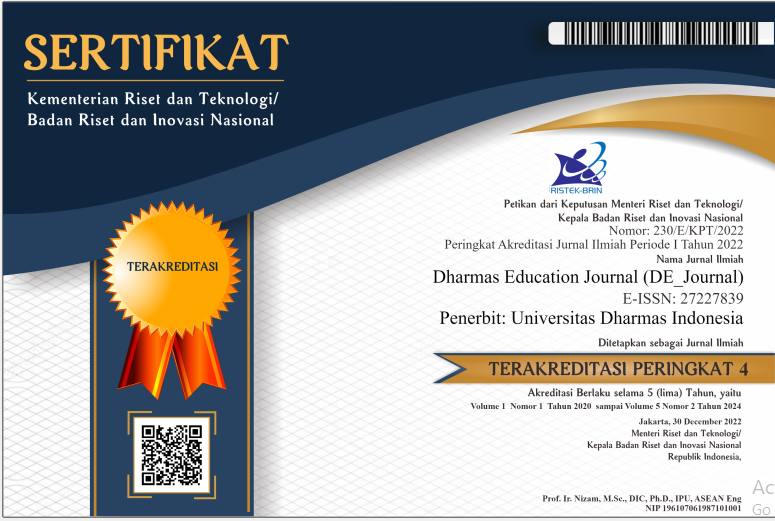TINGKAT KEMANDIRIAN BELAJAR SISWA KELAS XII SMK AL-HUDA BUMIAYU DI MASA PEMBELAJARAN DARING
DOI:
https://doi.org/10.56667/dejournal.v3i1.639Keywords:
Independent Learning, Online Learning, Covid-19 PandemicAbstract
The Covid-19 pandemic then resulted in changes in the management of the education system in Indonesia. The government provides a policy to implement online learning so that the learning process can still be carried out. One of the objectives to be achieved from the research is to find out the high or low level of student learning independence during online learning. This research is a quantitative research with the type of descriptive survey research. The research population included all class XII students of SMK Al-Huda Bumiayu. Samples were taken by 106 students using the Saturated Sampling technique. In this study, data collection was carried out using a learning independence scale through google form. The results showed that 77.3% of students had a high level of learning independence, it could be seen from the preparation before taking part in learning such as making an additional study schedule to meet the learning targets achieved, making a summary of the material, studying the material from various references, assuming the task given by the teacher was a challenging challenge. must be resolved. When viewed from the gender of women tend to have high independence compared to men as many as 55 respondents. The conclusion of this research is that there is independent learning in the online learning period with a high category. Although all students are able to independently manage the learning process, there are still some students who are still unable to manage their learning time. The teacher is still the center of the learning process and dominates teaching and learning activities.
Downloads
References
Ahmad, F., & Ibda, H. (2021). Desain Pendidikan dan Teknologi Pembelajaran Daring. In Qahar Publisher.
Ali, M., & Asrori, M. (2008). Psikologi Perkembangan Remaja, Perkembangan Peserta Didik. Jakarta: PT Bumi Aksara,. Hal.
Ciotti, M., Ciccozzi, M., Terrinoni, A., Jiang, W. C., Wang, C. Bin, & Bernardini, S. (2020). The COVID-19 pandemic. In Critical Reviews in Clinical Laboratory Sciences. https://doi.org/10.1080/10408363.2020.1783198
Daniel, S. J. (2020). Education and the COVID-19 pandemic. Prospects. https://doi.org/10.1007/s11125-020-09464-3
Firdaus, F. (2020). IMPLEMENTASI DAN HAMBATAN PADA PEMBELAJARAN DARING DI MASA PANDEMI COVID 19. Utile: Jurnal Kependidikan. https://doi.org/10.37150/jut.v6i2.1009
Handayani, A. S., & Ariyanti, I. (2020). Kemandirian Belajar Matematika Siswa Disaat Pandemi Covid-19. UrbanGreen Conference Proceeding ….
Kusuma, D. A. (2020). DAMPAK PENERAPAN PEMBELAJARAN DARING TERHADAP KEMANDIRIAN BELAJAR (SELF-REGULATED LEARNING) MAHASISWA PADA MATA KULIAH GEOMETRI SELAMA PEMBELAJARAN JARAK JAUH DI MASA PANDEMI COVID-19. Teorema: Teori Dan Riset Matematika. https://doi.org/10.25157/teorema.v5i2.3504
Marhayani, D. A. (2020). Kemandirian Belajar Mahasiswa PGSD dalam Perkuliahan Secara Daring Pada Masa Pademi Covid-19. JPDI (Jurnal Pendidikan Dasar Indonesia). https://doi.org/10.26737/jpdi.v5i2.2156
Mariana, D. (2021). Analisis Kemandirian Belajar Siswa SD Pada Masa Pandemi Covid-19. Bina Gogik: Jurnal Ilmiah Pendidikan Guru Sekolah Dasar.
Muhali. (2018). Membangun Pendidikan yang Mandiri dan Berkualitas pada Era Revolusi Industri 4.0. Seminar Nasional Lembaga Penelitian Dan Pendidikan (LPP) Mandala.
Onah, D. F. O., & Sinclair, J. E. (2017). Assessing Self-Regulation of Learning Dimensions in a Stand-alone MOOC Platform. International Journal of Engineering Pedagogy (IJEP). https://doi.org/10.3991/ijep.v7i2.6511
Pujiriyanto, P. (2021). Pembelajaran menyenangkan sebagai upaya menanggulangi pandemi Covid-19. Epistema. https://doi.org/10.21831/ep.v2i1.40129
Rosali, E. S. (2020). Aktifitas Pembelajaran Daring Pada Masa Pandemi Covid -19 Di. Geography Science Education Journal (GEOSEE).
Siahaan, M. (2020). Dampak Pandemi Covid-19 Terhadap Dunia Pendidikan. Jurnal Kajian Ilmiah. https://doi.org/10.31599/jki.v1i1.265
Sumarmo, U. (2002). Kemandirian Belajar: Apa, Mengapa, dan Bagaimana dikembangkan pada Peserta Didik Oleh: Utari Sumarmo, FPMIPA UPI. Academia.Edu.
Sundari, S., Fuadi, D., & Hidayati, Y. M. (2022). Kemandirian Belajar Matematika Masa Pandemi Covid-19 pada Siswa Sekolah Dasar. Jurnal Basicedu. https://doi.org/10.31004/basicedu.v6i1.2233
Surahman, E., Santaria, R., & Setiawan, E. I. (2020). Tantangan Pembelajaran Daring di Indonesia. JKelola: Journal of Islamic Education Management.
Widodo, L. S., Prayitno, H. J., & Widyasari, C. (2021). Kemandirian Belajar Matematika Siswa Sekolah Dasar melalui Daring dengan Model Pembelajaran Flipped Classroom. Jurnal Basicedu.
Yusri, D., Dausat, J., & Yukl, A. (2020). Analisis Kemandirian Belajar Siswa Selama Pembelajaran Daring ( Studi Tentang Model dan Penerapannya di MTs Swasta Zakiyun Najah Sei Rampah ). Jurnal Bilqolam Pendidikan Islam.
Downloads
Published
How to Cite
Issue
Section
License
Copyright (c) 2022 DE_JOURNAL (Dharmas Education Journal)

This work is licensed under a Creative Commons Attribution-NonCommercial-NoDerivatives 4.0 International License.
Makalah yang disampaikan diasumsikan tidak mengandung bahan propietary yang tidak dilindungi oleh hak paten














